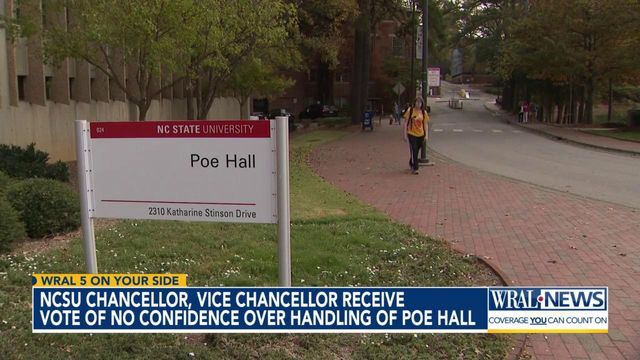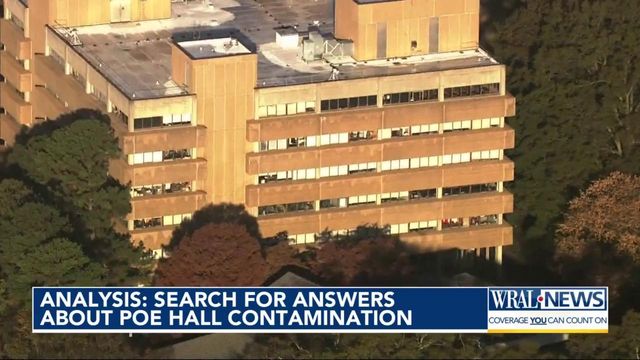NC State chancellor, vice chancellor receive vote of no confidence over handling of Poe Hall
On Monday, the College Coordinating Committee for North Carolina State University's College of Education announced the results of separate votes of no confidence against Chancellor Randy Woodson, Executive Vice Chancellor and Provost Warwick Arden and Dean of the College of Education Paola Sztajn over their handling of Poe Hall.
View WRAL's complete coverage of Poe Hall
Faculty in the College of Education voted they did not have confidence in Chancellor Randy Woodson or Executive Vice Chancellor and Provost Warwick Arden. Dean of the College of Education Paola Sztajn survived the vote.
"I speak for both the provost and myself when I say that while we are disappointed in the results, it’s important that you know that we are committed — as we always have been — to maintaining our community’s trust in leadership and this institution," Woodson said in part. "This situation is exceedingly challenging, both from a logistical standpoint and from what I recognize are very real anxieties about personal health."
N.C. State closed the building, home to the College of Education, in November. Since then, university employees and students have been critical over perceived lack of transparency from the university, especially regarding reports of cancer or serious illness in people who spent time in Poe Hall.
The vote came days after a 5 On Your Side report revealing the university was no longer participating in an independent health investigation.
The vote is largely symbolic since faculty do not have the authority to remove university leaders from office.
“We will reconvene faculty to gather ideas on what we would like to see from leadership going forward to restore confidence. It is clear from this vote that faculty are divided. We view our role as members of the faculty who can help facilitate this process and work towards actionable measures that will restore confidence and community within the College of Education,” the committee wrote in a document that included the results.
“This has been an exceedingly hard process and the College Coordinating Committee is very concerned about the long-term effects that this ordeal will have on our faculty, staff, and students. We endeavor to work with college and university leadership to offer some guidance on how to best support the members of our community."
Referencing Woodson, the committee wrote, "Due to his mismanagement of the Poe Hall PCB contamination and cancer cluster issue, the faculty of the College of Education at North Carolina State University no longer have confidence in the leadership of Chancellor Woodson.”
The results are as follows:
Chancellor Randy Woodson:
- Votes of no confidence: 54%
- Votes of confidence: 25%
- Abstained votes: 22%
Executive Vice Chancellor and Provost Warwick Arden:
- Votes of no confidence: 58%
- Votes of confidence: 17%
- Abstained votes: 25%
Dean of the College of Education Paola Sztajn:
- Votes of no confidence: 49%
- Votes of confidence: 35%
- Abstained votes: 15%
Why did NC State hold a vote?
The College Coordinating Committee stated that it received several emails expressing concern and dismay about the lack of communication and transparency at the university regarding Poe Hall, according to a note sent out to education faculty last Wednesday.
N.C. State closed Poe Hall in November after toxic chemical testing revealed PCB levels 38 times higher than what is deemed safe for humans. PCBs, once used in building and manufacturing, are now linked to cancer.
Prior to closing, Poe Hall housed the College of Education and the Department of Psychology. Many students report to WRAL News that they took classes in Poe Hall on a variety of subjects.
Allegations of a ‘lack of communication and transparency’ and calls for a third-party investigation:
Hundreds of students and current and former N.C. State employees tell WRAL News they want more information regarding the potential health impacts of PCBs in Poe Hall.
Last December, N.C. State hired a consulting firm to investigate the building; however, WRAL News has confirmed multiple times that the university is not conducting or involved with any formal human health investigation.
Last week, Chancellor Randy Woodson wrote the university is studying the building with health concerns in mind.
The state Department of Health and Human Services confirmed to WRAL News that it is not investigating Poe Hall.
The Centers for Disease Control and Prevention told WRAL News that federal investigators ended a formal investigation called a Health Hazard Evaluation after N.C. State would not move forward in the process, instead, asking for a "pause."
N.C. State denies asking for a pause; however, a letter sent to the CDC on behalf of N.C. State reveals that N.C. State told federal investigators the building was closed and open only to certain personnel.
A Health Hazard Evaluation is a free and independent health investigation that could review reports of illness, conduct medical exams, and collect samples at Poe Hall.
More than 100 reports of cancer reported to WRAL
Several people who worked or studied in Poe Hall confirm to WRAL News they tried reporting their health issues or cancer to N.C. State but did not hear back.
Over the course of a nearly three-month investigation, WRAL's 5 On Your Side has independently confirmed more than 100 reports of cancer in people who spent time in Poe Hall.
Most of the people who reported their cancer to 5 On Your Side did so because the university was not collecting that information.
While it is unknown if the PCBs in Poe Hall have anything to do with the cancers, the people who are now struggling with health issues feel the university should do more to look at their health and the potential health impacts of Poe Hall.
Other than the N.C. State-funded building investigation, the university has not confirmed any other investigations taking place.











